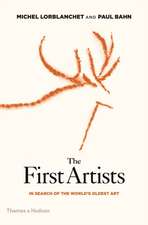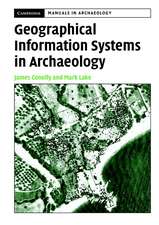The Plurality of Power: An Archaeology of Industrial Capitalism: Contributions To Global Historical Archaeology
Autor Sarah Cowieen Limba Engleză Paperback – 19 apr 2013
The Plurality of Power: Industrial Capitalism and the Nineteenth-Century Company Town of Fayette, Michigan, explores the subtle distribution of power within American industrial capitalism through a case study of a company town. Issues surrounding power and agency are explored in regard to three heuristic categories of power. In the first category, the company imposed a system of structural, class-based power that is most visible in hierarchical differences in pay and housing, as well as consumer behavior. A second category addresses disciplinary activities surrounding health and the human body, as observed in the built environment, medical artifacts, disposal patterns of industrial waste, incidence of intestinal parasites, and unequal access to healthcare. The third ensemble of power relations is heterarcical and entwined with non-economic capital (social, symbolic, and cultural). Individuals and groups drew upon different forms of capital to bolster social status and express identity both within and apart from the corporate hierarchy. The goal in combining these diverse ideas is to explore the plurality of power relationships in past industrial contexts and to assert their relevance in the anthropology of capitalism.
| Toate formatele și edițiile | Preț | Express |
|---|---|---|
| Paperback (1) | 636.63 lei 43-57 zile | |
| Springer – 19 apr 2013 | 636.63 lei 43-57 zile | |
| Hardback (1) | 643.34 lei 43-57 zile | |
| Springer – 21 feb 2011 | 643.34 lei 43-57 zile |
Din seria Contributions To Global Historical Archaeology
- 15%
 Preț: 640.24 lei
Preț: 640.24 lei - 15%
 Preț: 642.36 lei
Preț: 642.36 lei - 15%
 Preț: 643.84 lei
Preț: 643.84 lei -
 Preț: 399.12 lei
Preț: 399.12 lei - 15%
 Preț: 639.90 lei
Preț: 639.90 lei - 15%
 Preț: 644.82 lei
Preț: 644.82 lei - 15%
 Preț: 636.80 lei
Preț: 636.80 lei - 15%
 Preț: 643.84 lei
Preț: 643.84 lei - 18%
 Preț: 949.23 lei
Preț: 949.23 lei - 15%
 Preț: 640.24 lei
Preț: 640.24 lei - 15%
 Preț: 640.06 lei
Preț: 640.06 lei - 15%
 Preț: 641.71 lei
Preț: 641.71 lei - 15%
 Preț: 646.75 lei
Preț: 646.75 lei - 15%
 Preț: 642.03 lei
Preț: 642.03 lei -
 Preț: 390.46 lei
Preț: 390.46 lei -
 Preț: 391.79 lei
Preț: 391.79 lei - 15%
 Preț: 642.51 lei
Preț: 642.51 lei - 15%
 Preț: 647.73 lei
Preț: 647.73 lei -
 Preț: 383.71 lei
Preț: 383.71 lei -
 Preț: 387.96 lei
Preț: 387.96 lei - 15%
 Preț: 643.99 lei
Preț: 643.99 lei - 18%
 Preț: 968.65 lei
Preț: 968.65 lei - 15%
 Preț: 639.08 lei
Preț: 639.08 lei - 18%
 Preț: 954.93 lei
Preț: 954.93 lei -
 Preț: 384.86 lei
Preț: 384.86 lei - 15%
 Preț: 641.85 lei
Preț: 641.85 lei - 15%
 Preț: 641.53 lei
Preț: 641.53 lei - 15%
 Preț: 643.99 lei
Preț: 643.99 lei - 15%
 Preț: 645.28 lei
Preț: 645.28 lei - 18%
 Preț: 733.46 lei
Preț: 733.46 lei
Preț: 636.63 lei
Preț vechi: 748.97 lei
-15% Nou
Puncte Express: 955
Preț estimativ în valută:
121.82€ • 127.51$ • 101.39£
121.82€ • 127.51$ • 101.39£
Carte tipărită la comandă
Livrare economică 31 martie-14 aprilie
Preluare comenzi: 021 569.72.76
Specificații
ISBN-13: 9781461428114
ISBN-10: 1461428114
Pagini: 220
Ilustrații: X, 210 p.
Dimensiuni: 155 x 235 x 12 mm
Greutate: 0.31 kg
Ediția:2011
Editura: Springer
Colecția Springer
Seria Contributions To Global Historical Archaeology
Locul publicării:New York, NY, United States
ISBN-10: 1461428114
Pagini: 220
Ilustrații: X, 210 p.
Dimensiuni: 155 x 235 x 12 mm
Greutate: 0.31 kg
Ediția:2011
Editura: Springer
Colecția Springer
Seria Contributions To Global Historical Archaeology
Locul publicării:New York, NY, United States
Public țintă
ResearchCuprins
Chapter 1. the plurality of power in industrial capitalism: a case study of fayette, michigan.-chapter 2. working communities and the victorian-american company town.-chapter 3. critically reading power, landscapes, documents, and artifacts in industrialized society.-chapter 4. paternalism, resistance, and hegemony.-chapter 5. the class system.-chapter 6. bio-power: discipline, symbolic violence, and the privilege of hygiene.-chapter 7. social status and intersectional identities: consumer behavior, gender, and immigration.-chapter 8 symbolic, cultural, and social capital.-chapter 9. conclusion: power and industrial capitalism, past and present.
Recenzii
“The Plurality of Power adds to a growing corpus of literature centered on the archaeological investigation of capitalism. … her discussion of subtle forms of power is without a doubt the strongest contribution of her volume … . The Plurality of Power will motivate readers to think critically about the archives they pursue in constructing their narratives about the past and instruct them on how to glean the various power relationships from seemingly limited materials.” (Bradley D. Phillippi, Historical Archaeology, Vol. 52, 2018)
Notă biografică
The author received her Ph.D. in Anthropology from the University of Arizona in 2008, with a major in archaeology and a minor in sociocultural anthropology. Her M.S. in Industrial Archaeology is from Michigan Technological University. She also has over a decade of experience working in cultural resource management around the United States.
Textul de pe ultima copertă
How do people experience power within capitalist societies? Research presented here explicitly addresses the notion of pluralistic power, which encompasses both productive and oppressive forms of power and acknowledges that nuanced and multifaceted power relations can exist in combination with binary dynamics such as domination and resistance. This volume addresses growing interests in linking past and present power relationships engendered by capitalism and in conducting historical archaeology as anthropology.
The Plurality of Power: An Archaeology of Industrial Capitalism explores the subtle distribution of power within American industrial capitalism through a case study of a company town. Issues surrounding power and agency are explored in regard to three heuristic categories of power. In the first category, the company imposed a system of structural, class-based power that is most visible in hierarchical differences in pay and housing, as well as consumer behavior. A second category addresses disciplinary activities surrounding health and the human body, as observed in the built environment, medical artifacts, disposal patterns of industrial waste, incidence of intestinal parasites, and unequal access to healthcare. The third ensemble of power relations is heterarcical and entwined with non-economic capital (social, symbolic, and cultural). Individuals and groups drew upon different forms of capital to bolster social status and express identity both within and apart from the corporate hierarchy. The goal in combining these diverse ideas is to explore the plurality of power relationships in past industrial contexts and to assert their relevance in the anthropology of capitalism.
The Plurality of Power: An Archaeology of Industrial Capitalism explores the subtle distribution of power within American industrial capitalism through a case study of a company town. Issues surrounding power and agency are explored in regard to three heuristic categories of power. In the first category, the company imposed a system of structural, class-based power that is most visible in hierarchical differences in pay and housing, as well as consumer behavior. A second category addresses disciplinary activities surrounding health and the human body, as observed in the built environment, medical artifacts, disposal patterns of industrial waste, incidence of intestinal parasites, and unequal access to healthcare. The third ensemble of power relations is heterarcical and entwined with non-economic capital (social, symbolic, and cultural). Individuals and groups drew upon different forms of capital to bolster social status and express identity both within and apart from the corporate hierarchy. The goal in combining these diverse ideas is to explore the plurality of power relationships in past industrial contexts and to assert their relevance in the anthropology of capitalism.
Caracteristici
Focusing on the social and power relations on an industrial town Includes landscape as well as health-related research from the site which further demostrate the social, capitalistic and power relations in this community Makes use of GIS technology, which is becoming more prominently used in archaeological work Includes supplementary material: sn.pub/extras











